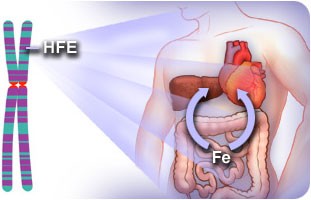Hereditary haemochromatosis is an autosomal recessive genetic disorder linked to iron metabolism, with an occurrence frequency of approximately 1 out of 200-400 people and a carrier frequency of 1 out of 8-10 people. Accumulation of excess iron in hereditary haemochromatosis results in injury or failure of various body organs, causing cirrhosis, diabetes, cardiomyopathies, arthritis and hypogonadotrophic hypogonadism.
Hereditary Haemochromatosis (HH)

The main cause of this genetic disorder is mutations in the HFE gene. The most prevalent mutation in the HFE gene is the C282Y mutation and is detected in >80% of affected individuals, whilst there are more than 10 other less frequent mutations. We test for the detection of the 12 most frequent mutations of the HFE gene, while in parallel we also test for the 4 most common mutations of the transferrin receptor-2 gene (TRF2).